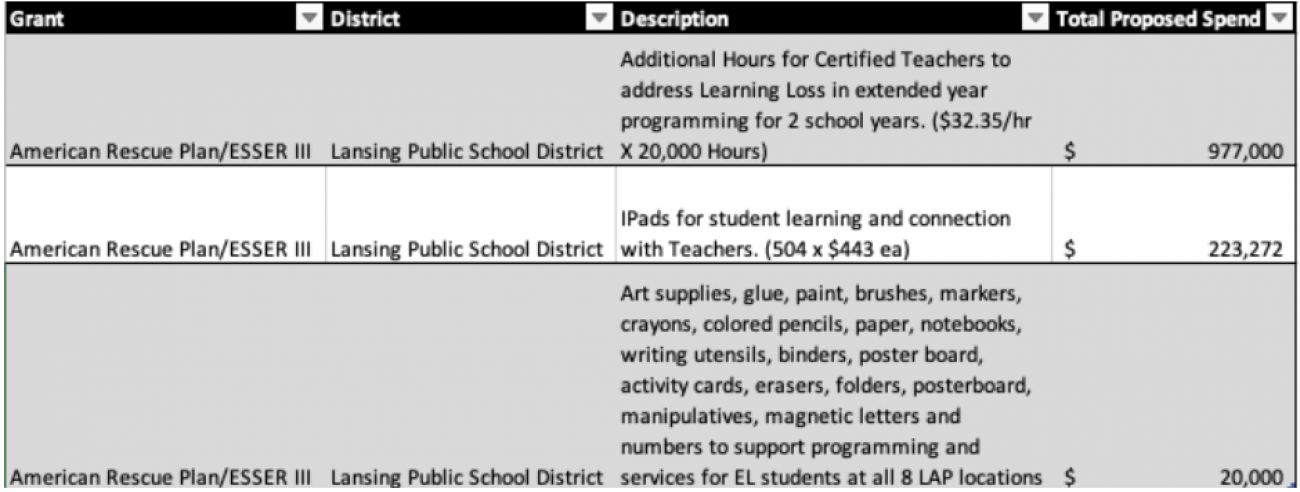State wants $10,620 to make public how Michigan schools spend COVID cash

- Michigan received $6.2 billion from the feds so districts could help students recover from the pandemic’s impact
- Chalkbeat first requested the records in May to learn how local districts planned to spend the taxpayer funds
- MDE wants $10,620 to release the data, saying it would take 807 hours of staff review to ensure no private info is disclosed
Michigan’s education system got $6.2 billion in federal COVID relief funding to help school districts mitigate the impact of the pandemic on students.
Now state officials want to charge $10,620 for access to the public records that contain detailed, updated information about how districts across the state plan to spend that money.
About the project
$6 billion. That’s how much Michigan schools are receiving from the federal government to help students and staff recover from the pandemic. But it isn’t entirely clear how this unprecedented amount of federal cash is being spent and whether it is having an impact.
Chalkbeat Detroit, the Detroit Free Press and Bridge Michigan have teamed up to find out where the money is going, who is benefitting and whether the money is helping students get back on track academically, emotionally and socially.
Please share your thoughts — and tips — by emailing [email protected], [email protected] and [email protected]
Chalkbeat requested the data from the Michigan Department of Education in May under the state’s Freedom of Information Act, as part of a reporting collaboration with Bridge Michigan and the Detroit Free Press. Reporters have fought the fee for months on the grounds that the information is a public record that should be made available for no charge.
Related:
- Lame Duck? Michigan session could be super lame this year
- Michigan student loan borrowers will have more time before payments resume
- 1-in-7 parents haven’t talked with child’s doc about vaccines for two years
State officials say the fee — which is considerably higher than what Michigan agencies typically charge for records requests — is needed to cover the cost of screening the data for possible privacy issues. Fulfilling Chalkbeat’s requests without compromising confidential information, they said, “would require careful scrutiny of 42 detailed federal grant applications and hundreds of lines of budget descriptions in one part of the request, and another 2,421 applications and thousands of lines more of budget descriptions in a second part,” along with redaction of any personal information.
Lawyers and advocates for transparency in government say the high MDE fee violates the spirit of freedom of information laws.
“It’s one of the big problems with Michigan FOIA that allows public bodies to hide behind excessive fee demands to keep the public in the dark about its own business,” said Herschel Fink, legal counsel for the Detroit Free Press.
The documents that reporters requested include line-by-line, written explanations of how each district planned to spend COVID relief dollars. The data offers the most up-to-date, detailed picture of the proposed spending — a tool that could help teachers and parents advocate for their priorities and raise concerns if they disagree with their district’s spending plans.
Districts have used the funds to hire social workers, expand summer school, hire tutors, purchase curriculums, among many other allowable uses.
District officials are required by law to get community input on their spending plans, but they aren’t required to share anything more than rough outlines of the plans they submit to MDE. Some districts have gone to great lengths to publicize details of their intended spending; others have not.
Individuals could try to get the detailed data or other records on their own from MDE or their local district. MDE has signaled that it’s willing to release the documents Chalkbeat requested — specifically, the budget detail page from districts’ applications for COVID relief grants — for individual districts.
A need for up-to-date data
At the core of Chalkbeat’s records request is a public need for current information about how districts plan to spend their federal COVID relief funds. The funds fuel a statewide effort to help address the academic and emotional distress that resulted from the pandemic.
Michigan, like all states, publicly releases extensive information about school spending, but that data lacks details about, for instance, which contractors districts intend to use for specific programs. What’s more, that information is released every January for the previous school year. That means spending recorded in September might not be published until more than a year later.
But parents and educators want to be kept up to date on districts’ spending of COVID relief aid, said Maria Lograsso, a parent, Harper Woods teacher, and organizer with the Michigan Caucus of Rank and File Educators, a group of unionized school workers.
“Not only do parents want to know that their kids are getting what they need, but teachers need to know that educators are getting what they need to help students recover from the pandemic.”
Teachers unions, too, have an interest in this data because it can be used to pressure districts about their spending priorities during contract negotiations. The federal dollars can be used to improve teacher working conditions through, for instance, reduction in class sizes or hiring support staff such as school counselors.
“It’s transparency and democracy,” said Toni Coral, president of the Hamtramck Federation of Teachers. “This is federal taxpayer money, and we should have an accounting. I think the information should be available. It seems to me that if you are trying to get people to trust you and to believe in you and to work with you, the information should be released.”
State says it’s concerned about confidentiality
In order to receive federal COVID relief dollars, every district in Michigan — more than 800 in all, including charter schools — has to submit detailed budgets to the state. District officials submit a form online explaining, item by item, how they intend to spend their grant funds.
Some districts proposed spending the money on just a few items — technology, or salaries, for example. Others submitted complex budgets including hundreds of lines.
Chalkbeat asked state officials in December 2021 for copies of the initial spending proposals submitted to that point. A department employee emailed Chalkbeat the full data set in a spreadsheet containing more than 30,000 lines.
Each line in the spreadsheet contained, among other data points, the name of the district, a dollar amount of the proposed spending, and an explanation of how the money will be spent.
The data looks roughly like this:

The data requested by Chalkbeat and its reporting partners goes beyond other publicly available records of COVID aid spending: It includes the “description” column that contains written explanations of every line item of proposed spending. Typically, the publicly available records group school spending into broad categories, making it difficult to pinpoint spending on specific programs.
MDE says the descriptions are at the center of its concerns about Chalkbeat’s request for updated budgets, because they could contain a student’s name or other personal information that is exempt from public records requests.
In months of working with the data, Chalkbeat has not encountered a student name.
When school districts submit the data to the state, they are instructed not to include student names or other information that the department isn’t allowed to release. MDE officials estimated that it would take an employee making $35 an hour, including benefits, 300 hours to read through the data in case schools didn’t follow those instructions. They later increased that estimate to 807 hours — the equivalent of 100 workdays.
“MDE has worked tirelessly to respond timely and as completely as possible to FOIA requests involving federal COVID dollars for schools,” said Martin Ackley, MDE spokesman, in an email. “Some requests, such as the one submitted by Chalkbeat, require more time and effort to respond.”
The employee who released the early data to Chalkbeat in 2021 later said that they did not mean to share the description field.
Ackley noted that the state has provided financial information about the COVID relief funds in an allocations portal on its website.
That portal connects to information about how much COVID funding districts received, but not how they plan to spend it. MDE also released written summaries from districts on their ESSER plans, but those summaries typically didn’t contain any specific spending proposals.
For instance, Lansing Public School District said in its publicly available spending description that it planned to provide “supplemental afterschool programs as well as tutoring, and summer learning for identified students to provide accelerated as well as continued instruction due to COVID-19 learning loss.”
But the district’s detailed budget, which Chalkbeat obtained in December 2021, specified that its extended year programming alone would involve paying teachers for an additional 20,000 hours of work over two years at a cost of $977,000.
In any case, state officials shouldn’t charge money for releasing the updated information they have, said Lisa McGraw, public affairs manager for the Michigan Press Association, even if it’s allowed by Michigan’s notoriously weak public records law.
“If you’re doling out that kind of money, you should be compiling the information” about how it’s spent, she said. “Taxpayers have a right to know where their money is going, and they shouldn’t have to pay to find that out.”
Jarrett Skorup, director of communications for the Mackinac Center for Public Policy, a free-market think tank, said the MDE should already have the data in a format that’s ready to release.
“It is bizarre that the Michigan Department of Education could provide similar documents very quickly a few months ago but cannot do so now,” Skorup said. “These are documents or data filled out by school districts and sent to the state — it seems like they should … be compiling this information in a spreadsheet.”
Koby Levin is a reporter for Chalkbeat Detroit covering K-12 schools and early childhood education. Contact Koby at [email protected].
Michigan Education Watch
Michigan Education Watch is made possible by generous financial support from:
Subscribe to Michigan Education Watch
See what new members are saying about why they donated to Bridge Michigan:
- “In order for this information to be accurate and unbiased it must be underwritten by its readers, not by special interests.” - Larry S.
- “Not many other media sources report on the topics Bridge does.” - Susan B.
- “Your journalism is outstanding and rare these days.” - Mark S.
If you want to ensure the future of nonpartisan, nonprofit Michigan journalism, please become a member today. You, too, will be asked why you donated and maybe we'll feature your quote next time!






